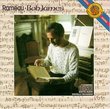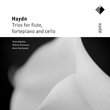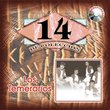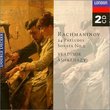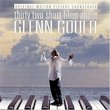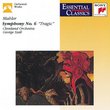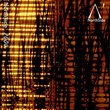| All Artists: Gidon Kremer, Yo-Yo Ma, Kim Kashkashian Title: Mozart: Divertimento, K.563 Members Wishing: 0 Total Copies: 0 Label: Sony Release Date: 10/25/1990 Genre: Classical Styles: Chamber Music, Historical Periods, Classical (c.1770-1830) Number of Discs: 1 SwapaCD Credits: 1 UPC: 074643956123 |
Search - Gidon Kremer, Yo-Yo Ma, Kim Kashkashian :: Mozart: Divertimento, K.563
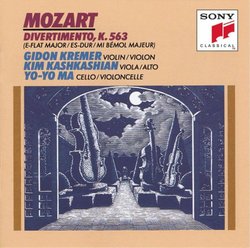 | Gidon Kremer, Yo-Yo Ma, Kim Kashkashian Mozart: Divertimento, K.563 Genre: Classical
|
Larger Image |
CD DetailsSimilar CDs
Similarly Requested CDs
|
CD ReviewsA Sublime Combination of Profundity and Grace James Skrydlak | Pella, Iowa | 06/07/2001 (5 out of 5 stars) "This piece, a divertimento for string trio (violin, viola, and cello, was composed in 1788, the same year as the E-flat, G-minor, and Jupiter symphonies and the little C-major piano sonata, four of Mozart's best-known and greatest pieces.This divertimento is relatively little-known (I count only eight recordings of it available as I write this in June 2001), yet it is, in my opinion, the equal of those far-better-known pieces. Mozart was at the absolute height of his powers as a composer, and it shows here. I find all Mozart's music to be quite pleasant; the best of it reveals layers and layers of meaning beneath the impeccably-polished surface, and so it is here. Every time I listen to this, I learn something new. Yet I believe that a listener whose favorite composer was, say, Lehar, would also enjoy this, as he would not enjoy, for example, the late Beethoven string quartets.The performance does an admirable job of achieving both the smooth surface and the multiple layers underneath. Even at full price for a disc containing approximately fifty minutes of music, this disc is well worth the money. When CDs were new, their containers were frequently called "jewel boxes". The term is particularly applicable to this disc." GOD-BELOVED DAVID BRYSON | Glossop Derbyshire England | 01/24/2005 (5 out of 5 stars) "This performance, and more particularly this piece of music, should be a lot better known than they are. It belongs in my own vinyl collection, but the quality on that is so good that no such technicality stops me from recommending this disc. If the cd sound is even better that can only be gilding the lily. For me, as for Shaw, there are a number of works by Mozart that put him finally in a class above and beyond Beethoven, and this is one of those works. Its format has probably helped keep it comparatively obscure. It is for the unusual combination of a single violin with viola and cello, and it goes under the unpretending title of `divertimento', in origin a piece of music for light social entertainment, in this case as if the god Hermes is present as one of the guests. The format is a standard 6-movement divertimento scheme, with two minuets, an adagio and an andante with variations as the four inner movements. This makes it a long work, but the performers rightly observe the repeats of both parts of the first movement, indicated by the composer simply because that was the standard thing to indicate in a divertimento. The instrumental writing is as effortless and natural as if this were a familiar everyday combination, and it seems to go for pages together without a double-stop. I recalled a remark put into the mouth of Salieri in the film Amadeus, to the effect that Mozart's compositions are finished as musical compositions are never finished. I recalled also a remark by Bernard Levin that Mozart and Schubert were the two composers who above all seemed to be a kind of channel through which music comes into this world - and who, or what, is at the other end? With Schubert I can at least partly articulate what I find at the earthly end, be it melody or modulation or something I at least have a word for. Mozart eludes even that. I could point to his unique phrasing, the most subtle and complex in all music, here and there, for instance in the `trio' section (in the other sense of the word) of the first minuet. I could compare the adagio here to the sublime slow movement of the G minor quintet. What I can't begin to articulate is what it is that makes me catch my breath right at the start, or what transfixes me in the theme of the final rondo, or what it is about the brief second subject of the first movement that seems to embody some ultimate shapeliness, simplicity and strength. The work is better known among professionals (small wonder!) than among the musical public at large. There appear to be a number of fine versions, but this particular account, veiled even more than usual here through being described as in E and not E flat, has a particular appeal for me. It would be quite wrong to single out any one of the players for special praise, but it's still inevitable that the top part will have most of the melody, and I have a strong personal liking for the marked and individual manner of Gidon Kremer. It falls to him to play the rondo theme, and he treats it as the sacred thing it is. In the second subject of the first movement I bless him for the inspiration of a slight but telling sforzando, the kind of touch - minute but infinitely effective - that in other contexts often sets the playing of Rudolf Serkin apart. I have talked for long enough, but perhaps I have conveyed something of what this composition seems to me to amount to." Jarring mozart K. Clevenger | 12/28/2006 (3 out of 5 stars) "I generally don't bother to write reviews, but I was so disappointed in this recording (especially in light of the other reviews posted) that I felt compelled to do so. In general terms I agree with what other reviewers have said regarding Mozart as a composer- a polished surface, with a delightful complexity and depth underneath. In this recording, however, that vibe is marred by the exaggerated (and in my opinion, forced and abrupt) changes in tempo throughout the piece. The transitions between segments are not smooth, and often I had the impression that the voices of the various instruments were competing. I feel that a sense of balance between the various instrumental parts of a Mozart piece is a key part of realizing the true genius of his music, so this didn't impress me much. Overall this rendition seemed to lack the finesse that I associate with WAM.
It may be my perception, but I also felt that the timing was off in some portions of the composition. One or two of the instrumental parts appeared to lag in tempo behind the others. To me this was distracting, especially since each musician, when considered individually, gave a stunning performance. I'm a little surprised that no other reviewer has made remarks to this effect. Finally, I'd like to interject a side note about the sound quality on this disk: overall it was fine, but there were passages (at least on the copy that I received) where the sound was interrupted. It sounded as if the recording was originally made on a tape which was damaged, and was then spliced together before transfer to the digital format. Taken together with the erratic changes in tempo and the lack of cohesiveness in the performance, I'm finding it hard to get much enjoyment from this recording." |

 Track Listings (6) - Disc #1
Track Listings (6) - Disc #1